- Home
- G. Wells Taylor
Painkiller
Painkiller Read online
The Variant Effect
PAINKILLER
G. Wells Taylor
Smashwords Edition
Copyright 2010 by G. Wells Taylor
All Rights Reserved.
This ebook is licensed for your personal enjoyment only. This ebook may not be re-sold or given away to other people. If you would like to share this book with another person, please purchase an additional copy for each person you share it with. If you’re reading this book and did not purchase it, or it was not purchased for your use only, then you should return to Smashwords.com and purchase your own copy. Thank you for respecting the hard work of this author.
Cover Design by G. Wells Taylor
Edited by Katherine Tomlinson
Website: SkinEaters.com
More titles at GWellsTaylor.com and Smashwords.com
****
CHAPTER 1
Borland cradled a glass as he sprawled on his swaybacked sofa, a half-bottle of whiskey on the coffee table in front of him. Too tired to do more than zip open his Variant Squad jumper for a bit of relief. His belly bulged out and up toward the cracked ceiling like someone was inflating it.
Coming out of retirement was thirsty work.
He had set himself up under a dim lamp he kept on the cracked veneer side table in his living room. The television sat across from him. He’d already turned it on, but only got a bright blue screen. Since his reinstatement as a Variant Squad Captain he’d found enough extra money to hook up the broadband again. The fact that he’d ordered it four weeks ago and the television was still a blue screen with nothing on it gave him something to chew about at coffee break if anyone would listen, but he didn’t really care.
Borland never watched much broadband anyway. Getting drunk and arguing with a blue screen made as much sense as yelling at the news. But hooking it up in the first place seemed like something that a normal person with responsibilities would do.
Stay focused. You rattled some chains.
He’d been on his feet all day talking to recruits so he’d grabbed his bottle when he got in, stuffed a couple pillows and an old winter coat against the arm of the couch and propped himself in a drinking position. There was still time to get a bit of a glow before bed—and he found he slept better with a few solid slugs in him—at least for the first half of the night. Also, the triple-meat sub sandwich he’d had for supper would start to react with the whiskey if he was stupid enough to lie down too soon. Borland was not a fan of heartburn, especially now that he was on the road to recovery.
He’d never be healthy, and he’d never be young again. But at least he could be watertight.
He had just finished reading a Team Omega comic book that he took from Zombie’s locker at the Stationhouse. Two days after quarantine ended, the other baggies were cleaning out his personal effects when Borland happened by. The young man’s involvement was weighing on him. Not so much from guilt—he’d do it again in a minute, the sacrifice had been worth it—but he was stricken with an intense curiosity about the young man who picked the shield-name Zombie. Borland had walked past a second time as the locker’s contents were being stuffed into a box.
Zombie’s parents had been told what happened to their heroic son, and would be anxious to get their hands on his possessions: just toiletries and T-shirts, underwear and hairbrush. But it was Zombie’s stuff, their little boy’s gear.
The third time Borland walked past the lockers, the box was sitting there unattended so he reached in and grabbed the comic.
He didn’t think mom and dad would miss it. And if things continued with the new Variant hybrid the way Brass’ scientists were predicting; they’d soon have too much on their minds to worry about their dead son’s possessions. Hell, they might even come to envy the boy in time.
Beachboy had said Zombie read re-issues of the actual Team Omega comics. The originals were published decades before, but had been re-released with upgraded artwork and re-purposed as graphic novels.
Borland couldn’t have cared less about the history lesson and he told Beachboy as much, but he could understand the novelty of a full-color paper version of something, over the insubstantial virtual incarnations that were flickering on e-readers and tablets everywhere.
He left the comic book on the coffee table for weeks—forgot about it for a time when other things came up.
Distraction from hell...
The comic was ragtag, the paper worn from many readings. There was a picture of a kid eating radioactive waste on the cover. But Borland had been pleased to find that the issue included Zombie’s namesake, Zombie the superhero. He turned out to be some dreamy character all in white and glowing green that had these foot-long eyebrows. It turned out that his powers came from insomnia. Not being able to sleep gave him the ability to talk to the dead and communicate and fight through the dreams of others.
Borland sneered at the stupid pack of made-up geek talk, but he found the story and pictures interesting enough, and easier to read than a wordy eBook. The story followed Team Omega fighting the Robot Maker—a mad scientist who wanted to rule the world with machines.
Borland had read through most of it the last couple nights, but had just finished the final chapters and epilogue.
He flipped it back to read the last page again:
With the world safe from evil once more, the team returns to Omega Island to unwind...
One joker named Blackout wore a dark hood with a single eyehole. He got his powers from boozing.
Borland liked him.
Deciding he needed air, Blackout tucked the bottle of whiskey under his arm and took the long stairs to the top of a tower to relax and, Borland imagined, get stinking drunk.
That’s the spirit!
And that was when Blackout ran into the prissy caped hero, this Zombie fellow, standing up there in the dark, watching the full moon and thinking.
Blackout was at the top of the stairs, and drinking up a storm. Then he noticed light coming from ahead.
Blackout said: “Oh, Zombie, can’t sleep either, huh? Want a drink?”
“No my friend, drink will not help,” replied the taller hero. The full moon was behind him. “I never sleep. That is the source of my power. I could not speak to the dead otherwise.”
Blackout drank.
“And because I never sleep. I can never dream,” Zombie lamented, while Blackout kept swigging whiskey in the foreground.
Zombie drooped into a sad pose overlooking the moonlit sea and said: “And without dreams, life has no meaning.”
That switched in the next frame to Blackout sliding down the wall plastered drunk saying: “Sure sounds to me like you need a drink.”
Borland knew that was supposed to be a funny ending to the adventure.
He turned the comic over in his hands before setting it down. The cover was frayed, and the pages tattered. It was clear that the issue was important to the Zombie Borland knew.
He had read it to pieces.
Dreams.
The kid got something out of it. Maybe something that made him decide to quit training for a mechanized army unit to volunteer for the Variant Squad.
Maybe something he thought would give his life meaning.
But it was something that got him killed.
Death can have meaning, too.
Borland struggled to get comfortable on the couch, but the action brought a riot of twinges, cramps and pains from his rewired guts.
Felt better, but just a bit.
He’d lost some weight too.
But just a bit.
Brass had come through on his offer to get Borland’s hernias fixed. That was five weeks ago, and the doctors said they wouldn’t do it unless he lost a lot of weight, but Brass just started pulling strings. The big man was good
at that. And like his bosses, he thought pulling strings didn’t leave fingerprints.
Borland winced again as his muscles cramped around the steel threads.
The sutures on all three hernias still stung—a mess: umbilical, right and left inguinal—both sides of the groin. There were disconcerting ridges of sewn muscle tangled in twists of fat, and post-operative drainage left his scrotum looking like a rotten avocado.
Not much of an improvement.
But even with the pain and discomfort, he couldn’t miss some of his old confidence creeping back.
How can you have confidence after what happened?
Because you’re a Captain and they’re the little people.
He was overcome by a wave of nausea as new memories crowded. Ghosts freshly buried shimmered in his mind.
It didn’t go well.
And right on the heels of the Parkerville tunnels and the business with Hyde’s daughter—it was almost too much for him.
And then...
The hernia operations were supposed to be simple. Textbook. Easy.
A bore.
Nothing to write home about.
Borland snarled, swung his legs off the couch and poured himself a drink.
He rolled the cool glass over his lips and remembered the clinic.
No. That was bad. The worst.
Things hadn’t gone well.
CHAPTER 2
The unmarked cruiser left Borland at the curb with barely a nod or a minute to pull his bags out of the back seat before the driver completed the circular loop of asphalt and tore away. The car pulled out with a lurch that caused Borland’s door to swing shut.
That after a long drive through Metro morning rush hour traffic with Borland’s guts nagging the whole way. The driver had said little as he navigated the crowded streets.
That would have been fine because Borland didn’t want to talk, considering his destination; but it ended up pissing him off because the driver had to know who he was. He had to know something about Borland’s past, if not about the recent events in Parkerville.
A week after his release from decontamination, there had been a gathering in the Metro HQ auditorium. Closed to the public, it included a long-winded and rambling speech from Superintendent Midhurst. Brass chipped in with an equally boring talk of lost heroes.
The higher ups had decided to link the squad memorial with Borland, Hyde and Aggie’s official reinstatement to active status. Someone up the chain had decided the reactivation of retired captains would somehow seem hopeful against the background of Stationhouse Nine’s first devastating win. Lots of people in uniform died so words had to be said, but Parkerville was shut down and the threat slowed if not stopped. The Variant presentations in Metro seemed to be leveling off—for now.
The dead baggies had been cremated long before the memorial, while the surviving squad was still in quarantine.
Borland had felt cheated that they combined the events, and worse that he and Aggie had to share the stage with Hyde’s hooded, but scene-stealing mystery. The old cripple had opted to ride his wheelchair to the event, even though Borland had noticed the cuffs and leggings of a new skin-shell suit protruding from his long black coat. He could have walked.
Playing the sympathy card.
He’d seen him at the stationhouse, mostly healed from his wounds, moving on his legs and canes like a mechanical toy.
But he got back into the chair for the big night.
Borland had trouble narrowing it down, especially since he’d consumed the better part of a mickey before the event, but there was something different about Hyde as he rolled across the stage.
He wouldn’t say “confidence,” but there was something in the way the freak held himself that spoke of willing compromise. If Borland didn’t know better, he might have thought it was pride.
Hyde didn’t save his daughter but he had tried. Was that all it took?
Just trying?
I’ll have to try it some time...
Memory of Hyde’s daughter caused a twinge of guilt, caused Borland’s chest to cramp and draw him gasping back to reality.
He’d done some terrible things.
And Brass knew most of it.
But not all and the information they shared created a checkmate.
Nobody could talk. Or everybody had to.
Borland realized he was still in place, glaring down the driveway after the cruiser.
A thought had struck him: The driver acts like he knows...
But Borland knew his first years of service back in the day had enough uncomfortable truths and rumors attached to warrant some suspicion if not outright disdain or hostility.
Never get a break.
He winced as he hefted his bags and turned. The action brought a hard and painful tug from his hernias.
Borland stood where the flattened wheelchair curb led up to a short sidewalk that crossed a narrow lawn to the front of the building.
It didn’t look like much. But that was a trick of the eye.
He knew from the website that the Shomberg Clinic was a sprawling complex of hospital rooms, dining areas and operating theaters hidden behind a ‘false front’ like the fake western streets in movie studio backlots.
This false front consisted of a main door and entrance arranged center to a set of four 30-foot pillars holding a paneled cupola that bore a spotlight pointed at the sidewalk. This would shine down where the circular drive met the walk. The driveway formed a tight oval around a bricked–in strip of grass bearing three crowded flower gardens.
The gardens reminded Borland of corsages.
The doorway and cupola were set on a large white-paneled building with black shuttered windows. It resembled a large house, its gaudy entrance crowded by tall thick cedars. All of it was intended to evoke a colonial country charm but managed to remind Borland of a southern Civil War plantation house, slaves and secrets. A closer look showed him fake cedar shingle over aluminum siding, and false masonry glued to concrete.
Nothing old under the sun.
Coming in the drive, he’d already noticed the willows, blue spruce and pines that towered in groups around the property; giving the grounds a country club feel.
Paused before the entrance now, Borland could hear the unnerving repetitive action of many sprinklers: Hiss. Ssskin. Skin. Skin. Skin. Click. Hiss. Skin. Skin. Skin...
Everywhere water spurted or sprayed from spigots and sprinklers. A small army of people in blue coveralls tended the plumbing, moved about the grass and spring gardens with purpose.
On both sides of the winding drive coming in, Borland had seen sections and segments of brownstone wall construction with cedars and gardens hugging them tight. The fortifications suggested a maze, defense and battle.
And confusion.
Unless it signified a war on hernias? That was all they did at the Shomberg Clinic: eradicate the scourge of ruptured abdomens.
Borland managed to chuckle at that, was sure he would have laughed if he wasn’t sober. He couldn’t drink before the operation.
That was the deal.
And the hard part.
His face drooped into a frown as he hefted his bags and walked toward the entrance.
CHAPTER 3
A pair of middle-aged nurses with throaty, heavy smokers’ voices scowled at Borland after taking his name, then they ordered him to have a seat in the waiting room.
He hesitated to give them a glower of his own.
What’s your Goddamn problem?
He crossed the carpet and paused at the open doors of the waiting room to frown at the crowded couches and chairs—hoping his toxic expression would free him from doing more than sitting quietly and waiting for his turn with the hernia doctors.
Borland resented the Joe Anybody approach but he’d already messed up his first exclusive crack at it, and he didn’t want to—check that, couldn’t blow it again.
One short week before, Borland showed up drunk for his appointment and the doct
or that Brass had arranged for his pre-op wouldn’t touch him in that state. When the sawbones asked Borland to leave and he refused, a couple of burly orderlies dragged him out. They’d been nice about it, like the doctor gave them a wink or something—but the bulls deposited Borland on a bench at the curb and called a taxi for him.
He’d only meant to have a couple blasts to take the edge off. After all, it wasn’t much more than a month after Parkerville and he was still feeling shaky with nightmares full of panic, spooks—and zombies now.
Ssskin. Let it go. Get past it.
Night terrors were old hat, it was the day terrors that he couldn’t get used to.
That’s why you’re a Captain and they’re not.
The Variant Effect was on the rise again. Simple as that. He didn’t believe Brass’ projections that presentations were gradually tapering off, and he knew that maintaining a cordon around Parkerville was just a show for the media.
Variant was already in Metro.
Borland knew how it worked. The Variant Effect came out of the shadows, explosively. One minute, it was on the decline, the next you had presentations everywhere. And with a new hybrid on the loose, anything could happen.
Knowing that, it was understandable that he needed a drink before he’d let some stranger handle his testicles in a building full of scalpels. That was part of the reason Brass had arranged his surgery at the Shomberg Clinic. It had an almost perfect record going back long before the day, and was the favorite of armies, law enforcement and athletes. It wasn’t state-of-the-art in hernia repair, it was the art with only a one percent failure rate.
Safest place in the world to get it done.
So why are you worried?
Borland slapped a hand against the ornately molded doorframe and glared at the assembled guests, some rookies and others he knew would be veterans either getting old scars checked or new holes plugged. You could tell by the look. Anyone showing confidence either wasn’t about to have his groin cut open, or he’d had it done before.

 Dracula of the Apes 2
Dracula of the Apes 2 Dracula of the Apes 3
Dracula of the Apes 3 The Urn
The Urn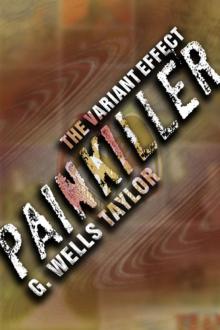 Painkiller
Painkiller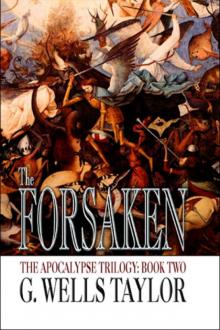 The Forsaken - The Apocalypse Trilogy: Book Two
The Forsaken - The Apocalypse Trilogy: Book Two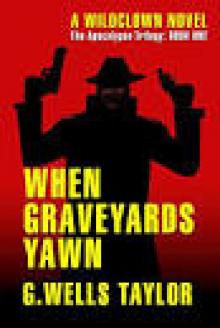 When Graveyards Yawn
When Graveyards Yawn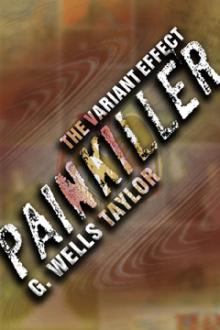 The Variant Effect: PAINKILLER
The Variant Effect: PAINKILLER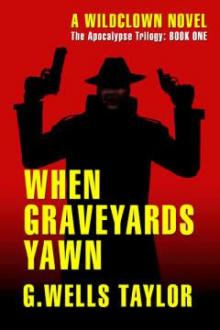 When Graveyards Yawn ta-1
When Graveyards Yawn ta-1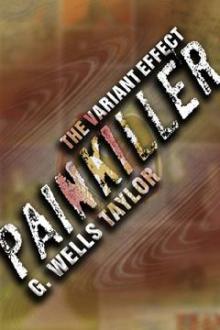 Painkiller tve-2
Painkiller tve-2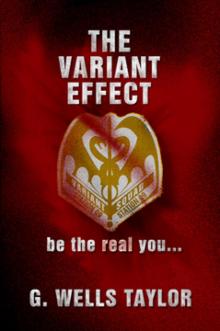 The Variant Effect
The Variant Effect